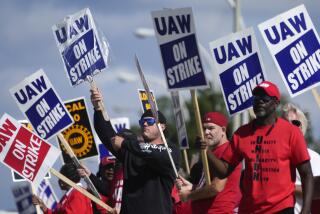UAL Stock Plunges on News of Snag in Buyout Financing
More bad news about the financing of its $4.38-billion employee buyout sent the stock of UAL Corp. into a tailspin Tuesday amid speculation that the bid for the parent of United Airlines may have to be altered or that the employees will ask for an extension of the Aug. 9 financing deadline.
UALâs union-led employee group sought late in the day to quash growing fears that its proposed buyout is in trouble following a trade publication report that some of its banks are reconsidering their informal agreement to arrange about $4 billion in bank financing.
âWhile there remain a number of significant issues to be resolved, we expect to continue to be able to work toward solutions,â the union group said in a statement.
The banking industry publication American Banker quoted unidentified sources Tuesday as saying that representatives of Citicorp and Chase Manhattan did not attend a meeting last Friday on possible bank financing for the UAL buyout. Previous reports had Chemical Banking Corp. pulling out of the group, at least for now, because the UAL employees have been unable to find an outside equity investor.
Fridayâs meeting was attended by only Bankers Trust New York and Manufacturers Hanover, the newspaper said. The agreement with the five banks, which were to lend $500 million each and help arrange the rest, was tentative.
Former Chrysler Vice Chairman Gerald Greenwald, who heads the employeesâ acquisition group and will become UALâs chief if the buyout succeeds, has been pressuring aircraft and engine manufacturers to invest in the buyout. Greenwald has said the group is close to finding an equity partner.
UALâs stock plunged $16.875 a share Tuesday to close at $140 on the New York Stock Exchange. The stockâs fall dragged the rest of the market with it; the Dow Jones industrial index closed down 12.13 points to 2,905.20. UAL took a smaller hit Monday, dropping $6.125 a share on other reports of financing problems.
Last October, a $6.75-billion takeover by United pilots, management and British Airways collapsed when financing failed, and the Dow Jones industrial index responded by dropping 190 points.
The union group declined to comment Tuesday on the banksâ skittishness except to say that it âwill continue to work with a core group of banks to develop a capital structure satisfactory to them from a credit and syndication point of view.â The group said it is still talking with aircraft and engine suppliers and with institutions interested in buying company aircraft and leasing them back to United to raise cash.
The banks declined to comment. Spokesmen for Boeing and General Electric, two companies previously mentioned as possible investors, also refused to comment.
Analysts and professional stock speculators known as arbitragers theorized that the union group may be forced to alter the terms of the deal, perhaps by lowering the $201-per-share price or by allowing the public to continue to own part of the company, which would mean that the employee group would not have to buy as much stock.
âIt all comes to whether Greenwald can browbeat the manufacturers to come up with some money . . . (but) the manufacturers are reluctant to do that. They donât want to be in a position to invest in another customerâs competitor,â said Scott Hamilton, editor of Commercial Aviation Report, a Dallas-based publication that specializes in airline financing.
âBut I would not be willing to say that some sort of financing will not ultimately show up,â Hamilton added.
Investment adviser and arbitrager Sharon Kalin said she has been advocating that the unions keep some public ownership of UAL.
âI think theyâre going to have to restructure this dealâ to get financing, said Kalin, who is president of Athene-Coronado Management Co. in New York. A deal with a 20% public stake would require $1 billion less in financing, she said.
âThis is such a roller coaster. Iâm begging to get off,â said Kalin, who has a âsizable positionâ in UAL and has been following the companyâs multiple takeover attempts for four years.
More to Read
Inside the business of entertainment
The Wide Shot brings you news, analysis and insights on everything from streaming wars to production â and what it all means for the future.
You may occasionally receive promotional content from the Los Angeles Times.










